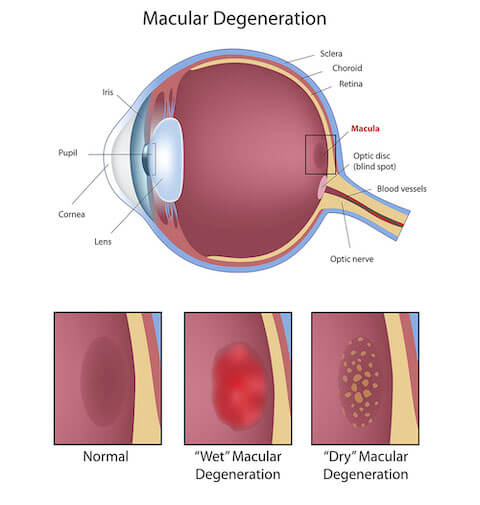
Macular degeneration is the leading cause of vision loss in America, affecting more people than cataracts and glaucoma combined. It is also an incurable eye disease that affects more than 10 million Americans. The eye doctors at Shoreline Vision are experienced and knowledgeable when it comes to treating patients with macular degeneration and other serious eye conditions.
What Is Macular Degeneration?
Macular degeneration is a degenerative eye condition caused by the deterioration of the central part of the retina. The retina is the back layer of the eye that is necessary for recording images and sending them from the optic nerve to the brain.
The central part of the retina, called the macula, handles focusing central vision in the eye. Central vision is key for tasks like driving a car, reading a book, recognizing faces, or seeing objects in fine detail.
In the early stages, macular degeneration does not affect vision. As the condition progresses and worsens, it may result in completely losing all central vision. Because macular degeneration only affects central vision, patients with the condition retain their peripheral vision.
What are the Types and Stages of Macular Degeneration?
There are two different types of macular degeneration: dry and wet. The dry type of macular degeneration is the most common, as it affects 85-90% of patients with diagnosed macular degeneration.
Wet macular degeneration is much less common, and only affects about 10-15% of patients. For younger patients with macular degeneration, they may have a form of the condition called Stargardt disease, which is caused by a recessive gene.
If a patient has macular degeneration, the disease goes through three stages.
- Early AMD: In early AMD, most patients may not have experienced any vision loss yet. To diagnose this stage of macular degeneration, drusen must be present. Drusen are yellow deposits that form beneath the retina. Diagnosing AMD in its early stages is the best time since patients can start treatment earlier.
- Intermediate AMD: During the intermediate stage of AMD, patients may have started experiencing vision loss, but it is often not noticeable or troubling. At this stage, a comprehensive eye exam is given with specific tests. These tests look for larger deposits of drusen, as well as any pigment changes in the retina.
- Late AMD: In late AMD, patients have started to notice any vision loss that has already occurred.
What Causes Macular Degeneration?
Doctors are not completely sure what causes macular degeneration. They do know that factors include heredity, as well as the environment. Further research is required to better understand this eye disease.
Who is at Risk of Developing Macular Degeneration?
When it comes to developing macular degeneration, the biggest risk factor is getting older. Your risk of developing this eye disease only increases as you age, especially if you are 55 or older.
Other risk factors include the following:
- Smoking: If you are a smoker, you are more than twice as likely to develop macular degeneration.
- Genetics: If anyone in your family has had macular degeneration or currently has it, you are at a higher risk of developing it.
- Race: If you identify as Caucasian, you are more likely to develop macular degeneration than someone who is African American or Hispanic/Latino.
Can You Treat Macular Degeneration?
Although there is no cure for macular degeneration, there are treatment options available. How macular degeneration is treated depends on how much the disease has already progressed.
Treating Dry Macular Degeneration
In most cases, when treating early dry macular degeneration, doctors choose nutritional therapy. The idea behind nutritional therapy is that a diet that is high in antioxidants helps support the cells of the macula.
If a patient has a more advanced case of dry macular degeneration, supplements may be added into the diet as well. Supplements can help add higher quantities of vitamins and minerals. These vitamins and minerals may help increase healthy pigments while also supporting cell structure.
Treating Wet Macular Degeneration: Laser Treatment
One of the most common ways of treating wet macular degeneration is with lasers. One of these is a treatment called Photodynamic Therapy (PDT) with Visudyne. Visudyne is a drug that is injected intravenously.
It helps direct the laser to the affected area. Visudyne is a two-step procedure performed in a doctor’s office. The first step involves injecting Visudyne intravenously into the arm. The second step is to use the laser which produces a non-thermal light.
This non-thermal light is necessary to activate the drug and selectively destroys unwanted leaking vessels in the macula. This procedure seals any leaking vessels while leaving healthy vessels intact.
Although the treatment works quite well, multiple treatments are usually necessary. The drug is not a cure and cannot restore any vision already lost. It can only help preserve the vision that has not been lost.
Treating Wet Macular Degeneration: Anti-VEGF Therapy
Another quite common way of treating wet macular degeneration is using anti-VEGF therapy. VEGF stands for vascular endothelial growth factor. Anti-VEGF therapy is a periodic injection of a chemical, called an anti-VEGF.
When a patient does not have macular degeneration, VEGF is a healthy part of the eye that supports the growth of new blood vessels. In someone with macular degeneration, it is unhealthy and promotes the growth of new and weak blood vessels in the retina that leak blood and liquids into the retinal layers.
This leaking causes scarring in the retina, as well as the death of macular cells. Having anti-VEGF therapy shots prohibits the eye from forming any new blood vessels behind the retina. As a result, it may help prevent retinal leaking.
If you are suffering from macular degeneration, schedule an appointment at Shoreline Vision. With six locations in Norton Shores, Grand Haven, Muskegon, Spring Lake, and Fremont, MI, we are the eye care practice that is convenient for you.






